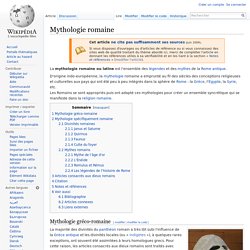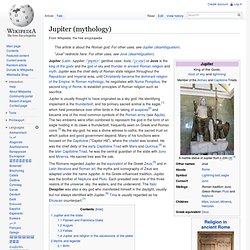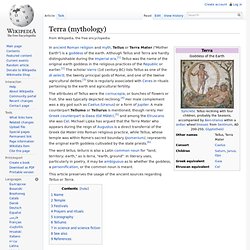

Which Two-headed God Is January Named After? January is often considered the month for deep reflection.

We look back at the year behind us, bemoaning our regrets and celebrating our successes. And then, we look forward to the future year. We make well-meaning resolutions and hope for the best. So, in this way, we’re all a little bit like Janus, the Roman god for which January is named. Janus is usually depicted with having two heads. that face in opposite directions.
(The poetic term John Keats coined that describes living your life while accepting that it is filled with uncertainty seems apropos to this transitional time. The god Saturn bestowed upon Janus this ability to see into the future and past. If you find it odd that a deity with two heads is the namesake for one of our prominent months, consider the story of the obscure, one-armed Norse god that Tuesday is named after. Mythologie Romaine. Mythologie romaine. Un article de Wikipédia, l'encyclopédie libre.

La mythologie romaine ou latine est l'ensemble des légendes et des mythes de la Rome antique. D'origine indo-européenne, la mythologie romaine a emprunté au fil des siècles des conceptions religieuses et culturelles aux pays qui ont été peu à peu intégrés dans la sphère de Rome : la Grèce, l'Égypte, la Syrie, etc. Les Romains se sont appropriés puis ont adapté ces mythologies pour créer un ensemble syncrétique qui se manifeste dans la religion romaine.
Mythologie gréco-romaine[modifier | modifier le code] La majorité des divinités du panthéon romain a très tôt subi l'influence de la Grèce antique et les divinités locales (ou « indigètes »), à quelques rares exceptions, ont souvent été assimilées à leurs homologues grecs. Mythologie spécifiquement romaine[modifier | modifier le code] « Rome a eu sa mythologie, et cette mythologie nous est conservée. . — Georges Dumézil, Horace et les Curiaces Divinités romaines[modifier | modifier le code] Jupiter (Father of mythology) The consuls swore their oath of office in Jupiter's name, and honoured him on the annual feriae of the Capitol in September.

To thank him for his help (and to secure his continued support), they offered him a white ox (bos mas) with gilded horns.[10] A similar offering was made by triumphal generals, who surrendered the tokens of their victory at the feet of Jupiter's statue in the Capitol. Some scholars have viewed the triumphator as embodying (or impersonating) Jupiter in the triumphal procession.[11] During the Conflict of the Orders, Rome's plebeians demanded the right to hold political and religious office. During their first secessio (similar to a general strike), they withdrew from the city and threatened to found their own. The augures publici, augurs were a college of sacerdotes who were in charge of all inaugurations and of the performing of ceremonies known as auguria. The role of Jupiter in the conflict of the orders is a reflection of the religiosity of the Romans.
Terra (Roman mythology) The word tellus, telluris is also a Latin common noun for "land, territory; earth," as is terra, "earth, ground".

In literary uses, particularly in poetry, it may be ambiguous as to whether the goddess, a personification, or the common noun is meant. This article preserves the usage of the ancient sources regarding Tellus or Terra. Dedicatory inscription to Terra Mater fulfilling a vow (votum), 1st century AD The two words terra and tellus are thought to derive from the formulaic phrase tersa tellus, meaning "dry land". [citation needed] The etymology of tellus is uncertain; it is perhaps related to Sanskrit talam, "plain ground The 4th-century AD Latin commentator Servius distinguishes between tellus and terra in usage.
Varro identifies Terra Mater with Ceres: The Temple of Tellus was the most prominent landmark of the Carinae,[14] a fashionable neighborhood on the Oppian Hill.[15] It was near homes (domūs) belonging to Pompey[16] and to the Cicero family.[17] Tellumo is identified by St. Which Two-headed God Is January Named After?